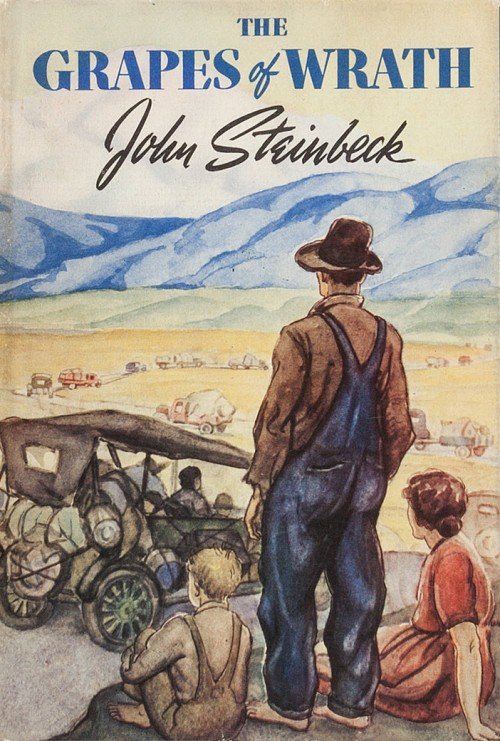
The Grapes of Wrath is a powerful and moving novel by John Steinbeck that tells the story of the Joad family, a group of Oklahoma farmers who are forced to leave their home during the Dust Bowl and migrate to California in search of work and a better life. Published in 1939, the book quickly became a bestseller and a classic of American literature, winning the Pulitzer Prize in 1940.
The Grapes of Wrath by John Steinbeck is a powerful and timeless novel that remains a classic of American literature. The book tells the story of the Joad family's migration from Oklahoma to California during the Great Depression, and their struggles to find work and survive in the face of poverty, discrimination, and exploitation.
Steinbeck's writing is both poetic and gritty, with vivid descriptions of the natural world and the harsh realities of life during this time. He portrays the Joad family and the other migrant workers they encounter as resilient, resourceful, and deeply human, with a sense of dignity and community that sustains them in the face of tremendous adversity.
The novel explores important themes of social justice and inequality, and Steinbeck is unflinching in his portrayal of the brutality and injustice faced by the Joads and other migrant workers at the hands of wealthy landowners and corrupt officials. However, he also offers a vision of hope and solidarity, suggesting that the power of human connection and the determination of ordinary people can overcome even the most difficult circumstances.
Steinbeck's writing style is both poetic and gritty, with vivid descriptions of the natural world and the harsh realities of life during the Great Depression. The novel is divided into chapters that alternate between the Joad family's journey west and a more general depiction of the social and economic conditions that led to the mass migration of people from the Great Plains to California.
At its core, The Grapes of Wrath is a story about the resilience and humanity of ordinary people in the face of tremendous adversity. The Joad family is portrayed as hardworking and proud, with a deep sense of family loyalty that sustains them through the many challenges they face on the road. Despite the often bleak and hopeless situations they find themselves in, the Joads and the other migrant workers they meet are depicted as resourceful, compassionate, and full of a kind of gritty determination that allows them to keep going even in the face of seemingly insurmountable obstacles.
The novel also explores themes of social justice and inequality, as the Joads and other migrant workers face exploitation, discrimination, and violence at the hands of wealthy landowners and corrupt officials. Steinbeck is unflinching in his portrayal of the brutality and injustice that permeate American society at this time, but he also offers a vision of hope and solidarity that suggests that the forces of greed and oppression can be overcome by the power of human dignity and community.
The main idea of The Grapes of Wrath by John Steinbeck is the struggle of the Joad family, a group of Oklahoma farmers, as they migrate to California in search of work and a better life during the Great Depression. The novel explores the themes of resilience, social justice, and the power of human connection in the face of tremendous adversity. Steinbeck depicts the harsh realities of life during the Dust Bowl and the exploitation, discrimination, and violence faced by migrant workers, but also offers a vision of hope and solidarity that suggests that the forces of greed and oppression can be overcome by the power of human dignity and community. Overall, the book is a powerful portrayal of the human spirit and the struggles of ordinary people during one of the most difficult periods in American history.
Overall, The Grapes of Wrath is a masterful work of literature that captures the spirit and struggles of a generation of Americans during one of the most tumultuous periods in our country's history. Steinbeck's prose is both lyrical and hard-hitting, and his characters are complex, realistic, and deeply human. The book remains as relevant today as it was when it was first published, and its themes of resilience, social justice, and the power of human connection continue to resonate with readers around the world.








